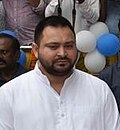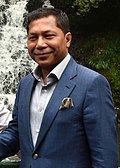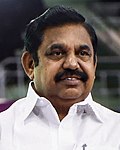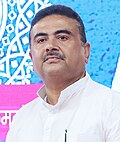Parliament of India
This is the list of current opposition leaders in the Parliament of India:
| Portrait | Name | Elected constituency | Term of office | Political party | |||
|---|---|---|---|---|---|---|---|
| Assumed office | Left office | Time in office | |||||
| RAJYA SABHA | |||||||
 | Mallikarjun Kharge | Karnataka | 16 February 2021 | Incumbent | 4 years, 332 days | Indian National Congress | |
| LOK SABHA | |||||||
 | Rahul Gandhi | Rae Bareli | 9 June 2024 | Incumbent | 1 year, 219 days | Indian National Congress | |






















